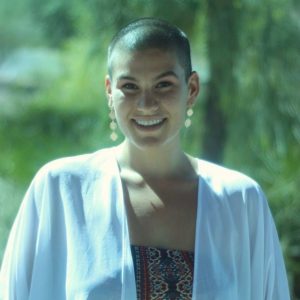The vegan smorgasbord on Aly Stoffo’s plate might be overwhelming for anyone else, but that is exactly what she’s cooking up. The food feast in her academic oven is a plant-based food event called: Eat Well Live Well. It’s a project she undertook for her Master of Sustainability Solutions (MSUS) culminating experience in partnership with Aramark — ASU’s primary food vendor and high-visibility supporter of university sustainability initiatives.
The March 14th (Pi Day) event celebrates sustainability through plant-based diets and has a goal to engage an audience of 500 students. From 11 a.m. to 2 p.m. on the day of the event, attendees will be able to explore plant-based dishes and principles of sustainability connected to food. In the works since August of last year, Stoffo couldn’t be happier to see her project ideas coming to fruition.
Something of this magnitude, of course, is only possible with technical, social, and financial support. Stoffo competed for a $1,500 Changemaker Sustainability Challenge grant to help fund her project activities. After winning the grant, Stoffo has the financial wherewithal to finally put her plans into action.
When asked about her partner, Stoffo said, “They run 64 operations on campus, they want to advertise their plant-based offerings on campus.” As a part of their Association for the Advancement of Sustainability in Higher Education (AASHE) certification, “the university is rated on the amount of plant-based products that they source and serve.” And, to help maintain and improve ASU’s consistently high AASHE rating, “Aramark wants to provide ASU with sustainable food, and this project is a part of that mission.”
Aramark’s goals are not the only goals of the event. Stoffo explains students need to be given reasons and opportunities to eat more plants, as a way to implement simple sustainability into their everyday life.
The demands of student life and ecological footprint minimization don’t always line up, but as Stoffo said, “To address these challenges, I make sure that every presentation I give is poised, well-rounded, and convincing. I try to come to meetings and class with a passion. I have to believe in myself at all times and constantly remind myself that I am on the right path.”
As with every project, obstacles appeared as Stoffo began the planning process. Her reluctance to speak publicly about her project was one, but she used it build her skills for future needs: “This project requires you to talk to a TON of people... I’ve had to give about 5 formal presentations on this project alone last semester, and numerous informal pitches. This (experience) helps work out the nerves of getting in front of crowds or pitching an idea to a future boss.” With good humor, she noted, “Keep in mind that we build these projects from scratch starting in August, so there’s a lot of networking and project management involved. I have never planned this large of an event with such a giant company. It’s going to look awesome on my resume.”
When speaking of how daunting this project is, Stoffo quickly references all the support she has received. Aramark and the Changemaker Sustainability Challenge Grant were at the top of her list but so were her course instructors and advisors, Paul Prosser and Caroline Harrison. Caroline Savalle, the internship coordinator at the School of Sustainability and Aly’s supervisor at her student worker position, pointed her toward the Challenge Grant. “I feel very supported and loved by my cohort, my teachers, Aramark, and others.”
Experts and support seemed to be the name of the game, and with so many helping hands, Stoffo lists key lessons from this project. “Go find three people who are experts and ask them to meet. You’ll learn so much from other people. There is always an answer to your question. Also, don’t overwhelm yourself. No one becomes a Master of Sustainability Solutions overnight. There are levels, and everything that you do is a stepping stone to get to the next greatest accomplishment.”
To measure the impact of the completed project, and the educational activities planned for the event, attendees’ reactions to plant-based diet options will be collected via a survey at Eat Well Live Well.
Although the intended outcome of the project is to empower attendees to make sustainable food choices, Stoffo is hoping to see attendees gain confidence in the idea that food from plants can be a positive change in their diets.
The goal of Eat Well Live Well is not to create a vegan community overnight, but to educate, excite, and empower people to make more effective choices. There are not many opportunities in our world where we can make a big impact three times a day. Having that kind of that power in your hands is a good feeling, especially for students with a smorgasbord of options in front of them.
